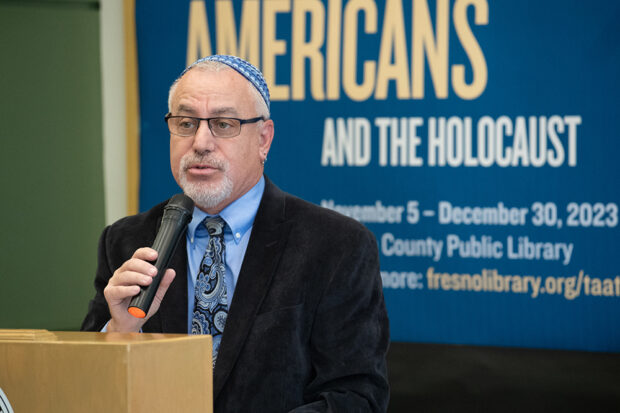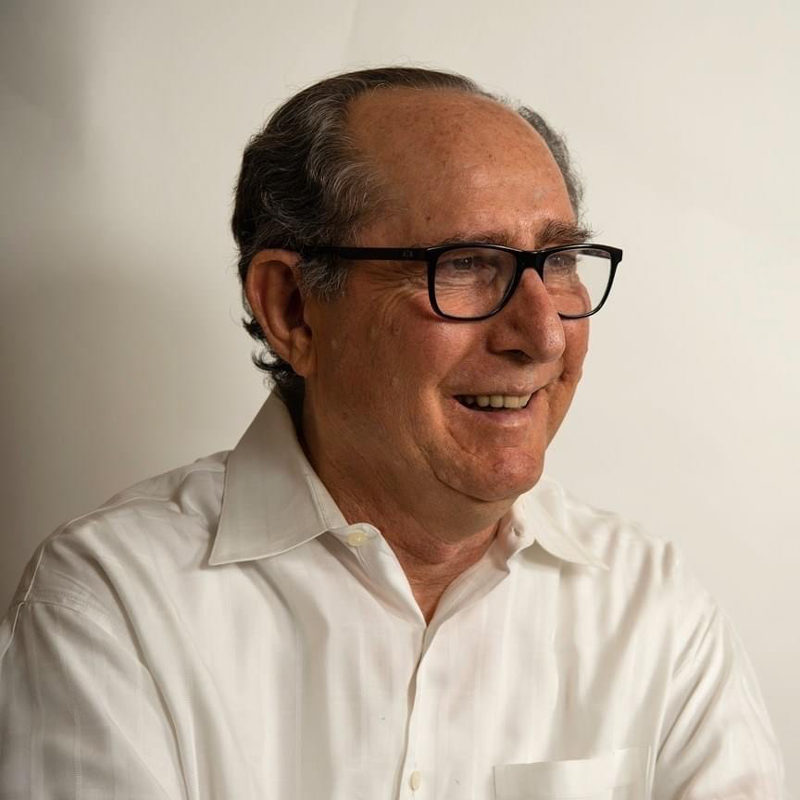
The traveling exhibit “Americans and the Holocaust” comes from the Holocaust Museum in Washington, D.C. It is circulating among only 50 libraries in the United States. Two are in California: the Fresno Central Library and the library at UC Irvine.
“It arrived in shipping crates,” said the Fresno County Library’s community engagement manager, Fae Giffen. “There were some instructions sent by the American Library Association, including a video of how to unpack it, and some floor plans we could choose from. Our maintenance crew was able to unpack it and put it together.”
The exhibit, a series of panels with photos and text and several video screens, is now in the Saroyan Gallery near the entrance of the Central Library on Mariposa Street downtown.
Giffen said that the exhibit has been well received. “We’ve gotten such positive feedback from the community about this exhibition.

“We’ve had a lot of people come up to staff and say how happy they are that this exhibition has been here, that they’ve really learned a lot, that they found it really interesting and they’re just really glad that they had the opportunity to tour it.”
It was standing room only at the opening ceremony on Nov. 5, when around 75 people came to hear a panel of speakers and take a first look at the exhibit.
Dr. Robert Nelson, superintendent of the Fresno Unified School District, said, “This exhibit that we celebrate today is a great way to expand our understanding and be comfortable with information that is at best unsettling, horrific at worst. But you can’t walk away from the things that happen in the world if you want to be an educator. [Learning] contributes to making us better human beings.”
Rabbi Rick Winer of Temple Beth Israel, the Reform congregation in Fresno, spoke briefly. “Here we are in the library surrounded by books,” he said.
“Books are a crucial part of Jewish tradition and certainly American tradition as well. Across town at Temple Beth Israel, we have quite a collection of books, but the most important ones [are] the scrolls that we call Torah.
“The Torah scroll contains our ancient legacy of sacred storytelling. One of our Torah scrolls came to us through the Memorial Scrolls Trust, which cares for just over 1,500 scrolls rescued from the Holocaust. After World War II, these scrolls were dispersed throughout the world as a living memorial to the culture devastated by the Nazis, to the people murdered by the Nazis.”
Dr. Nelson said that teachers in Fresno schools should be prepared to teach about the Holocaust, and that knowledge of the Holocaust ripples out into understanding of the trials and tribulations of many other minority groups.
“We really don’t need you as an educator in Fresno County if you don’t understand some of your history,” he said.
“You can’t really teach Hmong students without understanding something about the Secret War in Laos. Or the Armenian genocide. Or if you don’t know about redlining in 93706, or if you aren’t sure about braceros or you don’t understand migrant labor. There’s just some stuff you need to know if you want to work here in the Valley and serve the kids that we serve.”
Also speaking on Nov. 5 was Dr. Jill Fields, the founding coordinator of the Jewish Studies program at Fresno State.
She said that Jewish Studies crosses social barriers: “What I’ve found in my classroom is that our students of Armenian descent understand things about Jewish history and vice versa. This is a dynamic kind of relationship.
“I’ve also found Mexican American students, African American students, students of all backgrounds, Hmong students, they understand certain aspects of what we talk about in Jewish studies classes. And it’s that reaching out, reaching across boundaries [that] is so significant about having this exhibit here in Fresno.”
There has been a series of events around Fresno in connection with the exhibit. On Nov. 8, there was a lecture at the library at Fresno State called “Remembering the WWII Past through Popular Media,” given by Dr. Amila Becirbegovic. She herself is a survivor of the Bosnian genocide.
Dr. Becirbegovic has been teaching in higher education for 15 years. She is program coordinator for the German Studies program at Fresno State.
“My research,” she said, “is focused on genocide representation and how younger generations consume the past.”
Becirbegovic realized the importance of that area of research when she was starting out as a professor of Holocaust studies at Arizona State. It was 2009, and Quentin Tarantino’s film Inglourious Basterds had just been released. The film featured a fictionalized account of Hitler’s assassination in a movie theater in occupied France. Hitler actually died committing suicide in his bunker.
“Inglourious Basterds came out,” she said, “and the following Monday three young freshmen ran up to me so excited, and they said ‘Dr B.! Dr B.! We watched Inglourious Basterds, and we finally know!’ I asked, ‘What do you finally know?’ ‘We finally know how Hitler died!’” They had gotten the story wrong.
“I had spent two months going over maps and charts and dates,” she said, “and I realized none of that had sunk in, and that was when I tried to incorporate more popular representations into my genocide and Holocaust courses.”
In another event, on Nov. 14, the topic was the Japanese internment. Dale Ikeda, a retired Fresno County Superior Court judge, spoke at Temple Beth Israel.
He said that Japanese Americans during WWII were considered suspects as possible saboteurs or spies for the Japanese empire, which they were not. There were no cases of espionage or sabotage by any Japanese Americans. Nonetheless, Japanese on the West Coast were sent to camps, mostly losing their farms and businesses.
There were some positive stories from the period, Ikeda pointed out.
“Charles Pashayan was an insurance agent…Min Omata was his friend; they went duck hunting together, they were in the same blind,” Ikeda related. “On New Year’s Day, the Omatas invited the Pashayans over for sushi and sashimi.”
When Japanese began to be rounded up, Pashayan and Omata entered into an agreement that Omata would sell his ranch to Pashayan for one dollar and when they came back, Pashayan would sell it back for one dollar. “And that’s what happened, the Omata family got their farm back.”
In the 1970s and 1980s, there was movement toward reparations for the interned Japanese. Pashayan’s son, Chip, who had played as a child with the Omata children, had become a Republican member of Congress from the Valley. He was the first Republican to sign on to the Civil Liberties Act of 1988, the law providing for reparations to Japanese who were interned. Ikeda asked him about that afterward, and he said that he knew firsthand how the internment was unconstitutional.
Under the law, the internees each received $20,000.
Ikeda asked, “When you think about detention for nearly three years, what is that worth? Your business is lost, your farm may be lost, if you’re a student you can’t continue your education except through a leave program, and so that was the economic loss, but the loss of your freedom? You thought you were an American. You had these rights, now they were taken away. What is that worth?”
“The exhibition is going to be at the Central Downtown Library until Dec. 30,” says Giffen, with the Fresno County Library. “ It is free. You do not need registration. You don’t need to call ahead; you don’t need a library card. You can just show up and you can tour the exhibition. It’s designed to be self-directive and interactive, so you can just show up whenever it’s good for you.”
Learn more about both the exhibition and the supportive programs at fresnolibrary.org.

